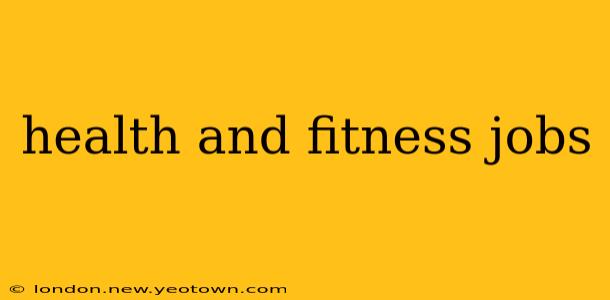The scent of sweat, the thrum of energy, the satisfying ache of a good workout – these are the hallmarks of the health and fitness world. But beyond the gym floor and the yoga studio lies a diverse landscape of career opportunities, each offering its own unique blend of challenge and reward. Whether you're a fitness fanatic, a health-conscious individual, or simply seeking a fulfilling career, the health and fitness industry might just be your perfect fit. Let's explore the exciting possibilities!
What are Some Health and Fitness Careers?
This isn't just about personal trainers anymore! The health and fitness industry is vast, encompassing roles that cater to every aspect of well-being. Think about it: we need people to design workout programs, teach classes, manage facilities, create nutritional plans, and even advocate for public health initiatives. The possibilities are endless. Some of the most popular options include:
- Personal Trainer: This is the classic entry point, involving one-on-one coaching to help clients achieve their fitness goals. It's a rewarding job, but requires dedication, knowledge, and strong interpersonal skills.
- Group Fitness Instructor: Do you thrive in a dynamic, energetic environment? Leading group fitness classes—Zumba, spin, yoga—requires charisma, expertise, and the ability to motivate a diverse group of individuals.
- Fitness Manager/Director: If you have leadership experience and a passion for operations, managing a fitness center could be ideal. This role involves overseeing staff, programming, and the overall success of the facility.
- Registered Dietitian/Nutritionist: For those with a science background, a career focused on nutrition offers immense impact. You could work with individuals or groups to create personalized meal plans, focusing on health, wellness, and disease prevention.
- Wellness Coach: This role blends fitness, nutrition, and mental health to help clients achieve holistic well-being. It requires empathy, coaching skills, and an understanding of human psychology.
- Physical Therapist: This healthcare profession focuses on rehabilitation and injury prevention. It demands a strong scientific background and a compassionate approach to patient care.
- Occupational Therapist: Similar to physical therapy, occupational therapy focuses on improving daily living skills through movement and activity.
- Health and Wellness Consultant: Providing guidance and expertise to individuals or organizations on improving their overall health and wellness.
What Education Do I Need for a Health and Fitness Job?
The required education varies drastically depending on the specific job. Some roles, like personal training, may only require a certification program, while others, like physical therapy, require a doctorate degree. Here’s a brief overview:
- Personal Trainer: Certifications from reputable organizations are usually sufficient.
- Group Fitness Instructor: Certifications are usually necessary and vary by discipline (yoga, Zumba, etc.).
- Fitness Manager/Director: A bachelor's degree in a related field (exercise science, kinesiology) is often preferred.
- Registered Dietitian/Nutritionist: Requires a bachelor's degree in dietetics, followed by supervised practice and a national exam.
- Physical Therapist/Occupational Therapist: Requires a Doctor of Physical Therapy (DPT) or a Master's degree in Occupational Therapy (MOT).
How Much Can I Earn in a Health and Fitness Career?
Salaries can range significantly based on experience, location, and the specific job. Entry-level positions might offer lower pay, while more specialized roles or those in leadership positions can command higher salaries. Furthermore, many in this field supplement income through private clients or freelance work.
What Are the Different Types of Health and Fitness Facilities?
The setting where you work can greatly influence your daily routine and the type of clients you serve. Opportunities exist in:
- Commercial Gyms: Large, well-equipped gyms catering to a diverse clientele.
- Boutique Fitness Studios: Specialized studios focusing on specific modalities (yoga, Pilates, cycling).
- Corporate Wellness Programs: Working within companies to promote employee health and wellness.
- Hospitals and Rehabilitation Centers: Working within healthcare settings to aid patients' recovery.
- Private Practice: Establishing your own business as a personal trainer or wellness coach.
What Skills Are Needed for a Health and Fitness Job?
Beyond specific certifications and degrees, certain soft skills are vital for success in this field:
- Communication: Clearly explaining exercises, dietary advice, and motivating clients is crucial.
- Empathy: Understanding and connecting with clients on a personal level fosters trust and results.
- Motivation: Inspiring clients to persevere and achieve their goals is a key element of the job.
- Problem-Solving: Adapting workout routines to accommodate injuries or limitations is essential.
- Time Management: Juggling multiple clients or classes requires strong organizational skills.
The health and fitness industry is a dynamic and rewarding field. By identifying your strengths, pursuing relevant education and certifications, and cultivating essential skills, you can embark on a journey that will benefit both your career and the well-being of others. The world of wellness awaits!

